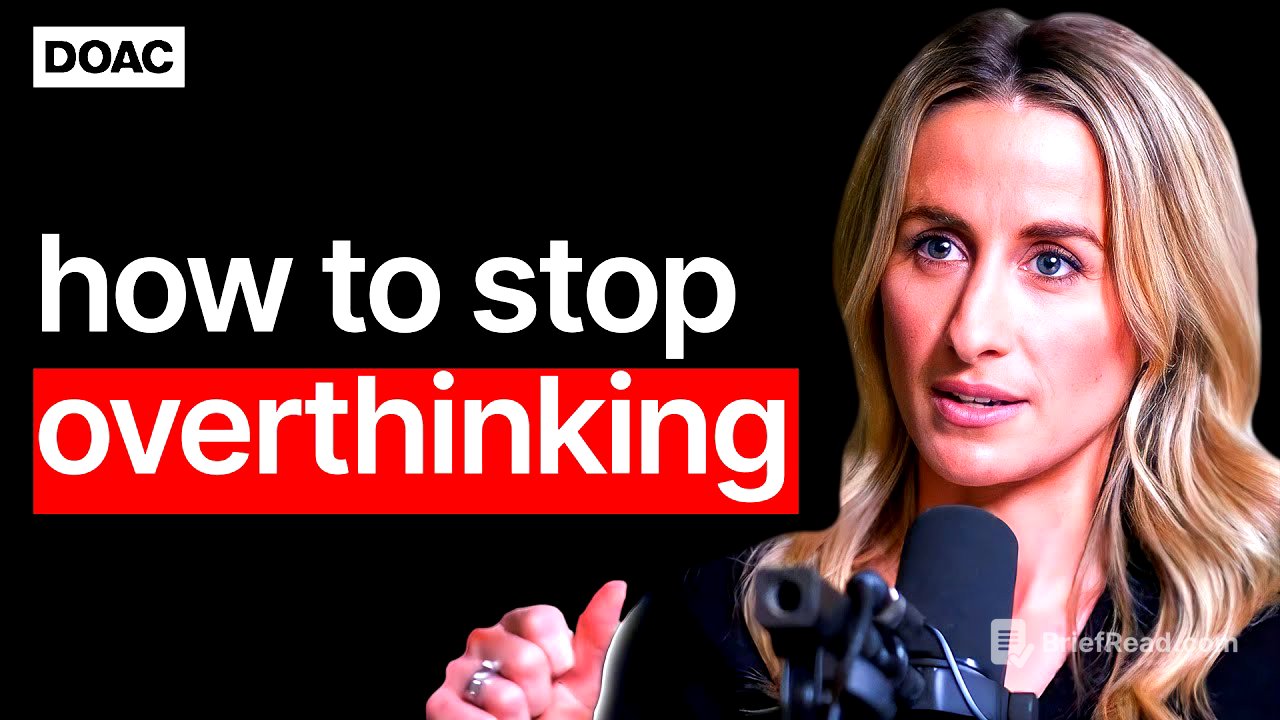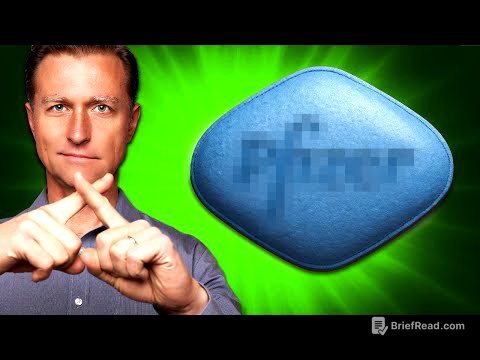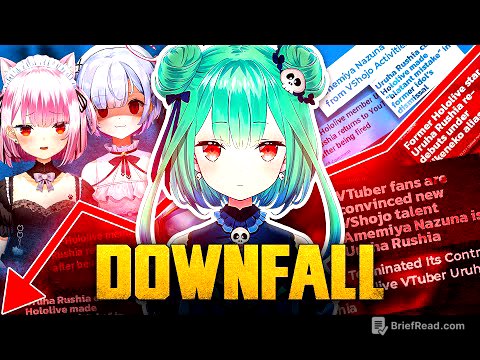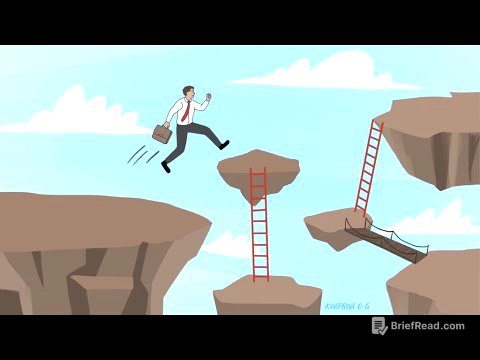TLDR;
In this episode of The Diary Of A CEO, Stephen Bartlett interviews Dr. Julie Smith, a clinical psychologist with a large online following, about mental health, managing stress, and finding purpose. They discuss the predictability of human behavior, the impact of social media on mental health, and the importance of values and relationships. Dr. Smith shares her insights on dealing with rejection, building confidence, and using breathing techniques to manage anxiety.
- Human behavior is predictable, but individuals are unique.
- Social media can be a powerful tool for mental health education, but it also brings challenges like imposter syndrome and negative feedback.
- Values guide meaningful change and help prioritize what truly matters.
- Relationships are crucial for a happy life, outweighing money and fame.
Intro [0:00]
Stephen Bartlett introduces Dr. Julie Smith, a clinical psychologist with a significant online presence, highlighting her ability to address stress, pressure, burnout, and overload. The intro touches on the importance of recognizing patterns and cycles in relationships and how therapy can be life-changing. Bartlett emphasizes the value of subscribing to the podcast for exclusive opportunities.
What made you want to help people? [0:58]
Dr. Julie Smith discusses her background and interest in psychology, noting that her childhood was normal without any major traumas that triggered her career path. She was always fascinated by people and their development, which led her to study psychology. She advises people to follow their interests when it comes to career choices, as it increases the likelihood of finding a job they love.
How did a therapist make it onto tiktok? [5:32]
Dr. Smith explains how she ventured into TikTok, initially hesitant due to the platform's association with dance and entertainment rather than mental health advice. She felt a need to make educational mental health information accessible, leading her husband to suggest creating short videos. Despite initial reservations about being trolled, the response was overwhelmingly positive, with many people finding her content helpful.
Dealing with rejection [14:13]
Dr. Smith shares her experience of dealing with negative feedback on social media, emphasizing that she is naturally introverted and shy. She discusses the mental filter, a cognitive bias where people focus on negative comments despite receiving numerous positive ones. She explains that rejection can feel like a threat of being ostracized from the tribe, triggering deep-seated desires to fit in and be accepted.
The consequences of having a big platform [23:46]
Dr. Smith discusses the challenges of having a large platform, including dealing with imposter syndrome and negative claims. She acknowledges the role of timing and luck in her success, particularly during the pandemic when more people turned to social media. She admits to questioning whether she wanted the public attention, especially given her desire to be present for her three young children.
Having the right values & goals [32:11]
Dr. Smith differentiates between values and goals, explaining that goals are finite achievements, while values are ongoing paths to follow throughout life. She emphasizes the importance of aligning actions with values and regularly evaluating whether one is living in accordance with them. She also shares a value-checking exercise to assess different areas of life and identify discrepancies between importance and fulfillment.
How do we make meaningful change? [39:04]
Dr. Smith shares her insights on how people create meaningful changes in their lives, emphasizing that sustainable change happens gradually through reflection and small actions. She underscores the power of developing habits and constantly reevaluating one's direction. She also acknowledges that healing takes time, and it's okay for the process to be gradual.
How do I change my mood? [40:36]
Dr. Smith discusses strategies for transforming bad days into better ones, highlighting the interconnectedness of decisions, mood, and behavior. She suggests that influencing the mind through the body, such as through exercise, music, or human connection, can create significant changes. She also notes that different things work for different people, so it's important to understand what works best for oneself.
How important is sleep? [42:46]
Dr. Smith emphasizes the importance of sleep for mood and mindset, acknowledging that it's often a struggle to prioritize sleep due to work demands and family responsibilities. She notes that lack of sleep affects performance and effectiveness, and it's crucial to take sleep seriously. She also challenges the cultural notion of "sleeping when you die," arguing that lack of sleep can lead to premature death.
How to stay motivated [45:12]
Dr. Smith discusses how motivation can wane when something becomes externally motivated, such as getting paid for a task. She emphasizes the importance of remembering the initial reason for starting something and maintaining a sense of integrity. She acknowledges that there are ups and downs in any job and that it's important to remember the values behind it to stay engaged.
What is the cure for overload? [48:09]
Dr. Smith defines overload as a result of being exposed to unrealistic ideals and trying to do everything perfectly. She suggests that it's okay to have goals that are less than others' and to decide what one wants their life to look like. She also emphasizes the importance of using one's values as a filter when navigating opportunities and making decisions.
The balance of embracing emotions vs ignoring them [51:23]
Dr. Smith discusses the balance between embracing and ignoring emotions, noting that it's a complex process. She explains that people with insecure or dangerous coping mechanisms may find it difficult to open up to emotions. She advises opening up gradually to emotions that feel less dangerous and overwhelming, and to approach emotions with curiosity rather than judgment.
The stigma around addressing a situation [54:32]
Dr. Smith addresses the stigma around discussing feelings, particularly among men. She notes that social media has facilitated conversations that people wouldn't have face-to-face. She emphasizes the importance of human connection and finding someone to talk to, or using writing or art to express oneself. She also highlights the value of reflecting on experiences without judgment.
How do you build confidence [1:00:41]
Dr. Smith shares her insights on building confidence, emphasizing that it cannot grow if one is never willing to be without it. She uses the analogy of balloons connected by a tube, where one balloon represents confidence and the other represents vulnerability. She advises doing things that make one nervous in manageable doses, as repetition helps the brain automate tasks and build confidence.
How important is it to not make decisions in high emotion moments? [1:03:21]
Dr. Smith discusses the importance of making decisions based on values rather than emotions, noting that people often seek therapy when they've lost touch with their values. She explains that acting based on short-term desires can lead to long-term problems, while acting based on values leads to a more meaningful life. She also emphasizes that emotions are information and should be approached with curiosity rather than judgment.
Building self esteem by having a good relationship with failure [1:07:32]
Dr. Smith addresses the topic of self-esteem, noting that it's based on an evaluation of oneself. She suggests that self-compassion is more useful than self-esteem, as it involves treating oneself with kindness and doing what's best for oneself. She also explains that self-esteem is based on evidence accumulated from experiences, and it's important to challenge negative core beliefs.
Using our breathing to manage anxiety [1:12:36]
Dr. Smith discusses the role of breathing in managing anxiety, explaining that it's one of the quickest ways to slow down the anxiety response. She describes box breathing or square breathing, a technique that involves inhaling, holding, exhaling, and pausing for equal counts. She also notes that prolonging the exhale can help calm the reaction quickly.
Is it important to understand we’re going to die? [1:20:53]
Dr. Smith shares her perspective on the importance of understanding one's own mortality, noting that it can be a source of meaning in life. She explains that the thought of death can be a source of fear, but it can also be a reason to live well and prioritize values. She also mentions the practice of imagining oneself on their deathbed and reflecting on what they want their life to have contained.
The importance of relationships [1:24:39]
Dr. Smith emphasizes the importance of relationships for a happy life, noting that they outweigh money, fame, and social class. She explains that human connection is a built-in stress resilience mechanism and that relationships are essential for well-being. She also challenges the social media expectation of perfect relationships and highlights the importance of following one's own path.
Are you happy? [1:32:07]
Dr. Smith answers the question of whether she is happy, stating that happiness is a feeling like any other and that she experiences a range of emotions. She expresses gratitude for her life and the health of her children, but acknowledges that life is a rollercoaster and there will be times when she is not happy. She also affirms that she will have her own back during those times.
The last guest question [1:33:33]
Dr. Smith answers the previous guest's question about what she would do differently if she didn't have to work, stating that she would spend more time outdoors with her children. She acknowledges that work and school commitments keep her busy, but she would prioritize being in nature if given the opportunity. Stephen Bartlett thanks Dr. Smith for her time, honesty, and brilliance, praising her book for being inclusive and easy to read.









